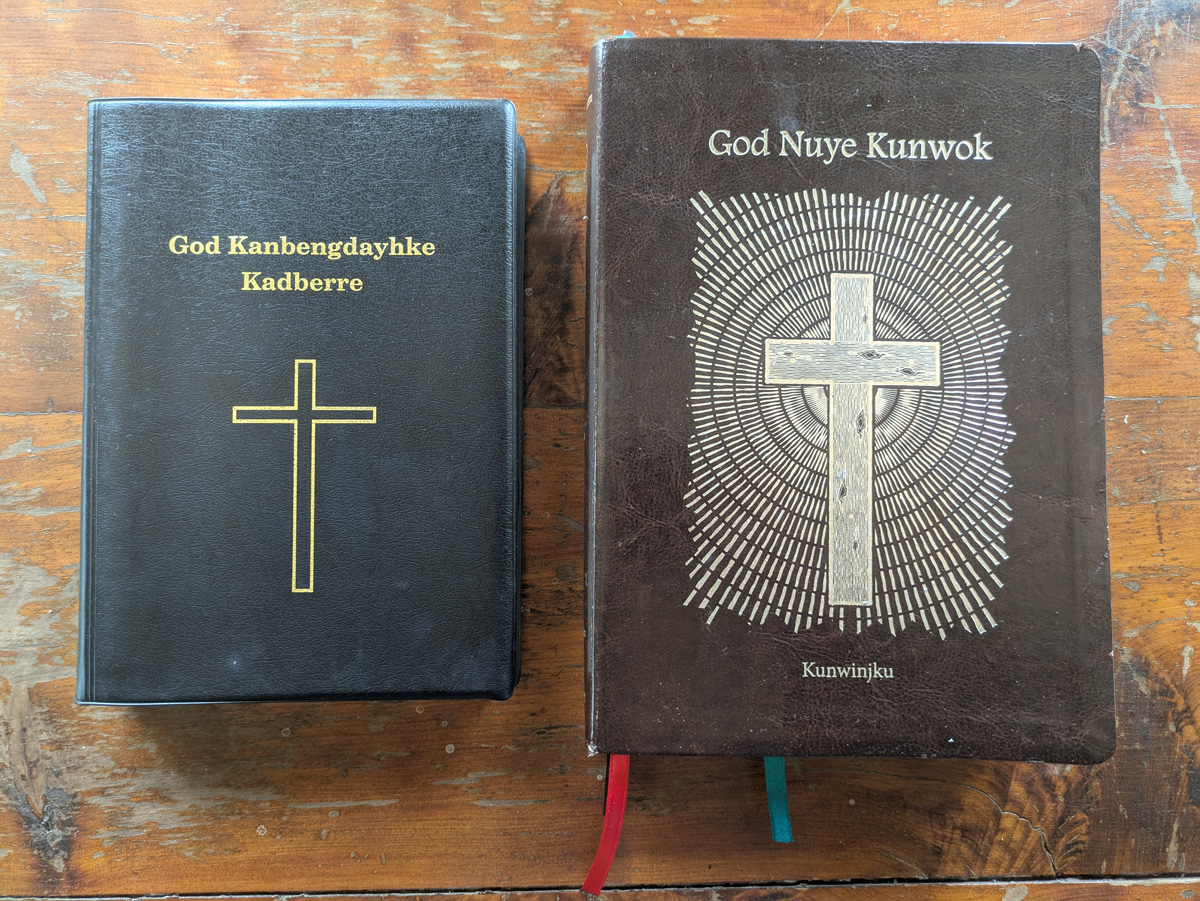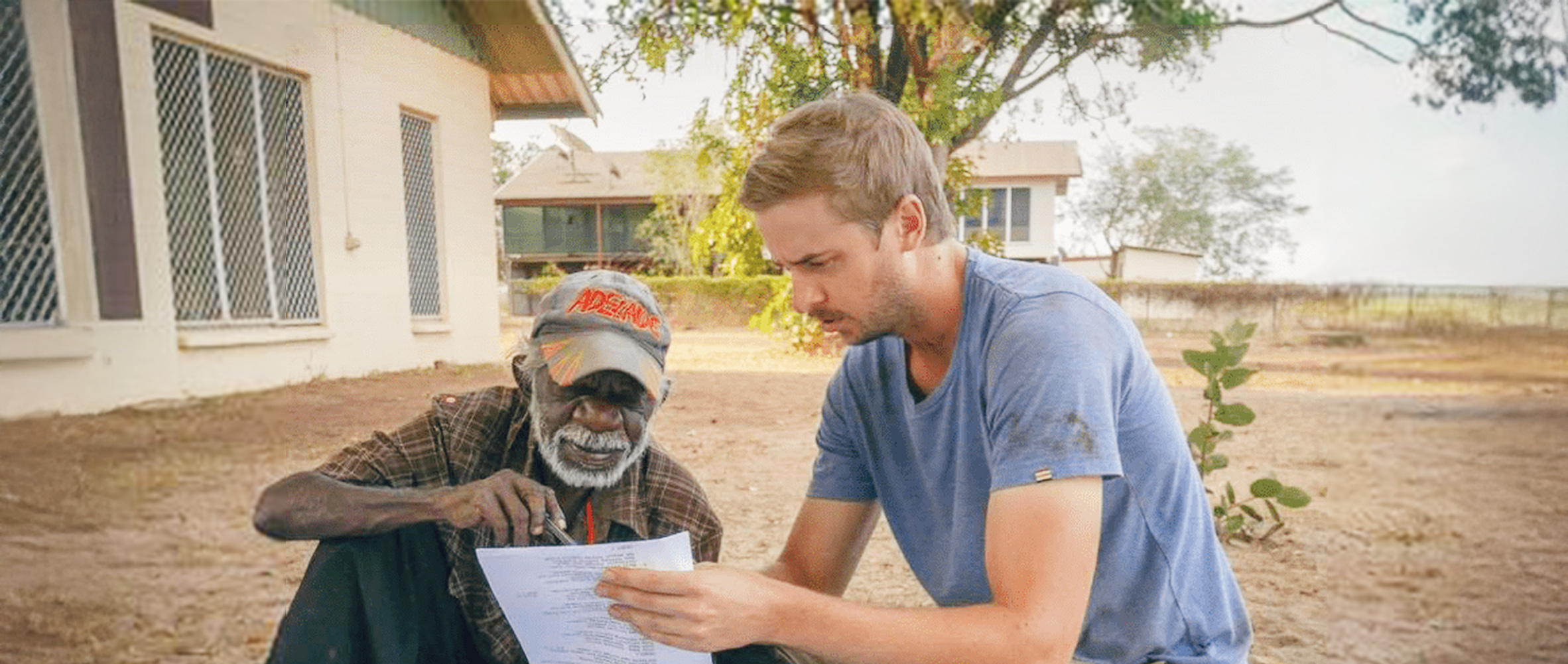The Living Word in Kunwinjku
CMS missionaries Matt and Lisa Pearson serve in Gunbalanya, walking alongside believers at Emmanuel Church and helping with the translation and oral recording of Scripture into Kunwinjku. In this article, Matt reflects on the history and development of this translation work, and its impact on the church in Gunbalanya, Northern Territory.
Nestled in the heart of West Arnhem Land, Gunbalanya (formerly Oenpelli) is a vibrant hub of the Kunwinjku-speaking community. Following the oral transmission of the gospel in the early 1900’s, the journey of translating the Bible into Kunwinjku—which began with Mark 1 in the 1930’s—marks a profound cultural and spiritual evolution, illuminating the power of God’s Word spoken in the native tongue of its people.
Historical background
The endeavour to translate the Bible into Kunwinjku started modestly, yet ambitiously, with the translation of the first chapter of Mark. The first time the gospel was read in an Aboriginal language in an Anglican church was at Christmas in 1936. The work was slow, the translation team aiming for five verses each afternoon under the shade of a bark hut.
Over the ensuing 56 years, this work expanded to include pivotal texts such as Genesis, Exodus, Ruth, Luke, John, Acts, and Ephesians, culminating in the publication of the Kunwinjku mini-Bible in 1992. This effort was not merely linguistic but a heartfelt exchange between cultures—bridging gaps and building understanding of the person and work of Jesus.
The impact of translation
The translation of the Bible into Kunwinjku heralded a new era of worship and understanding in Gunbalanya. Previously conducted in English, church services began to resonate deeply with the community as they heard and interacted with the scriptures in their heart language. This not only enhanced spiritual engagement but also fostered an environment where literacy and scriptural understanding flourished.

Left: The Kunwinjku mini-Bible. The text reads ‘God let us know.’
Right: The Kunwinjku Shorter Bible. The text reads ‘God’s Word’.
Recent developments
In 2018, the translation efforts took a significant step forward with the publication of the Kunwinjku Shorter Bible, which included the remainder of the New Testament. In the 339 Sundays since this publication, the Kunwinjku church has gradually read through the
New Testament. There are only four small books to go.
The impact of this is not surprising—transformed lives, the sanctification of the church, development in Kunwinjku literacy and an increased desire for more of the scriptures in language.
The work is continuing today with the translations of Deuteronomy and Ecclesiastes. Psalms 1-24 are already completed for publication, and the rest are awaiting final checks. This phase of translation has been marked by meticulous care and communal involvement, with the
goal that this translation will be accessible to future generations. Local translators are training the younger generations in both literacy and translation method here
in the community.

Community involvement
The translation project in Gunbalanya is a vibrant example of community collaboration. The process of checking the Psalms has involved 24 different adults from the community, indicative of a collective endeavour not just to translate but to ensure the translations resonate with the spiritual and cultural nuances of the Kunwinjku people.
Children, ever-present during these sessions, are growing up immersed in the language of the Bible, promising a future where these sacred texts continue to be a central part of community life.
Future aspirations
The community harbors deep hope for the future of Bible translation. There is a collective prayer that God will continue to raise a new generation of translators, equipped and fervent, to carry forward the legacy of making God’s Word accessible to all.
Amid this hopeful outlook, there is also a keen awareness of the spiritual challenges facing those on the front lines of this task, prompting prayers for protection against spiritual adversities and for the Spirit’s guidance in opening hearts to the gospel.
More than a linguistic achievement
The translation of the Bible into Kunwinjku is more than a linguistic achievement—it is a testament to the enduring power of God’s Word to transform communities. As the people of Gunbalanya continue to engage with the Bible in their native language, they are reminded of the profound truth that the Word of God is alive, relevant, and capable of reaching deep into the hearts of all who listen.
Header image: Matt Pearson sitting outside Emmanuel Church helps with the translation work.
GIVE
![]()
Financial help will ensure that the transformative power of the Bible in Kunwinjku continues to flourish, and that the next generation of translators is well-equipped. Could you contribute to this important work by giving to CMS missionaries in North Australia?












































































































